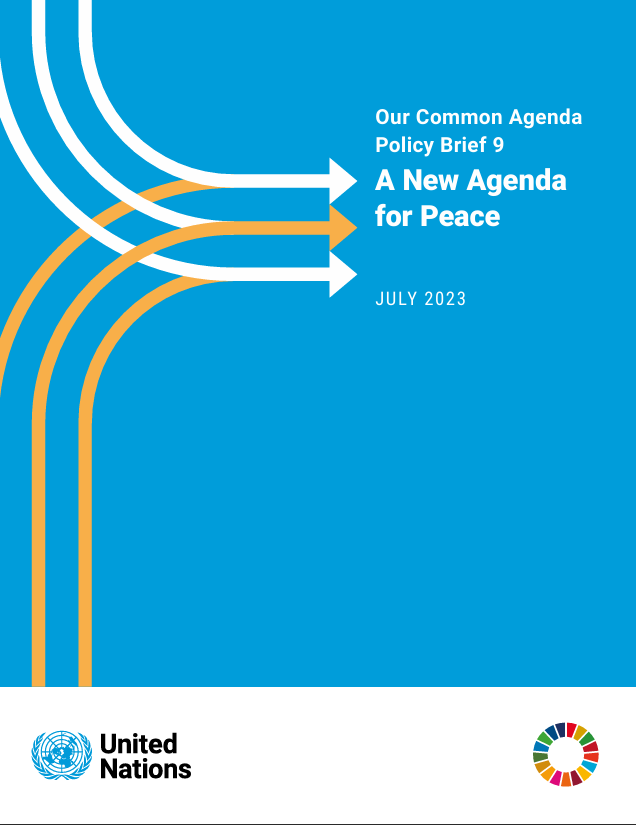Outlines a strategy for promoting global peace and preventing conflicts. It recommends recommitting to multilateralism, addressing inequalities, and harnessing diplomacy to manage geopolitical tensions. Set to be a significant contribution to the Summit of the Future in 2024, the brief aims to bolster global governance and uphold the UN Charter’s commitments.
Key Themes
- Strengthening Multilateralism:
- Stresses the need for enhanced global cooperation to manage interconnected threats to peace and security, urging Member States to bolster the multilateral system as the sole effective solution to these challenges.
- Addressing Inequalities and Injustices:
- Emphasizes the role of inequalities and injustices in fostering grievances and distrust, underlining the need to address these to prevent conflict and promote peace.
- Twelve Action-Oriented Recommendations:
- Suggests twelve actions for conflict prevention, management, and resolution. These aim to foster collective action for peace, considering the Advisory Board’s recommendations on Effective Multilateralism.
- Diplomacy for Peace:
- Diplomacy, a key tool for managing conflicts and geopolitical issues, requires a renewed commitment to peaceful dispute resolution using existing UN Charter mechanisms.
- Universal Action and Mitigation:
- Underscores that today’s peace and security threats demand universal action. Instability, violence, and potential conflict are global issues requiring a collective response.
- Building Trust and Solidarity:
- Trust, solidarity, and shared goals among Member States, supported by confidence-building mechanisms, are essential for effective collective security.
- Climate Action and Peacebuilding:
- Advocates for integrated approaches to climate action and peacebuilding and urges the Security Council to consistently address climate change’s impacts on peace and security.
Overview
Introduction
Stresses the need for Member States to enhance their commitment to strengthening the multilateral system to address global threats and uphold UN Charter principles. It acknowledges the growing distrust in multilateral solutions due to hunger, displacement, and inequality. The document underscores the urgency of environmental and conflict issues, the UN’s role in promoting trust, and the importance of the Summit of the Future for discussions about a shared future.
Principles for an effective collective security system
The UN Charter’s collective security system has achieved decolonization, nuclear disarmament, conflict prevention, and humanitarian responses. It emphasizes norms such as sovereignty principles, non-intervention, and peaceful dispute settlement, including Article 2(4) prohibiting force threats. It promotes a shift from competition to cooperation among Member States, aligning efforts towards shared goals and updating collective security mechanisms to address current and future challenges.
A vision for multilateralism in a world in transition
Emphasizes the need for innovative collective action among Member States to tackle global challenges and promote peace. It acknowledges the shift to a multipolar world and the need for multilateralism to adapt. Promotes transitioning from competition to cooperation, aligning national interests for collective peace efforts, and enhancing multilateral engagement. It also underscores the urgency of adapting to geopolitical realities and threats to reinforce collective security.
Recommendations for action
Underlines proactive and coordinated initiatives, prioritizing collaboration over competition and aligning national interests with the UN Charter. Trust-building among nations is highlighted for robust cooperation, fostering dialogue, consensus, and joint decisions. The recommendations also stress the need for flexibility and adaptability in response to geopolitical changes and threats, using diplomacy, conflict prevention, and peacebuilding to manage risks and maintain stability.
ACTION 1: ELIMINATE NUCLEAR WEAPONS
Calls for nuclear disarmament for global peace and security, addressing challenges to non-proliferation. It urges Member States to strengthen measures against nuclear weapon use and strive for their complete eradication. The brief underscores the link between non-proliferation and disarmament, the significance of keeping international promises, and the necessity of promoting peace and diplomacy.
- Urgent reinforcement of barriers against the use of nuclear weapons, acknowledging the existential threat they pose to humanity.
- Recognition of the interconnected nature of non-proliferation and disarmament, emphasizing that progress in one area requires progress in the other.
- Advocacy for the total elimination of nuclear weapons, highlighting the moral and ethical responsibility to prevent the catastrophic consequences of nuclear conflict.
- Call for collective action, dialogue, and cooperation among nations to advance nuclear disarmament efforts and strengthen the global non-proliferation regime.
- Emphasis on upholding international commitments and treaties related to nuclear disarmament while promoting a culture of peace, diplomacy, and conflict resolution to address the root causes of nuclear proliferation.
ACTION 2: BOOST PREVENTIVE DIPLOMACY IN AN ERA OF DIVISIONS
Emphasizes preventive diplomacy in the face of increasing global and geopolitical divides. It advocates for dialogue to prevent conflicts and promote peace, endorsing a proactive diplomatic approach. It underlines the necessity for engagement between nations through multilateral tools, showcasing diplomacy’s capacity to avert crises, maintain stability, and support UN principles.
- Emphasizing the critical role of diplomatic engagement and dialogue in bridging divides, preventing conflicts, and facilitating peaceful resolutions to disputes.
- Prioritizing preventive diplomacy to address the risks of deteriorating major power relations and the emergence of parallel blocs with conflicting interests.
- Advocating for a proactive approach to diplomacy that involves risk-taking, persistence, and creativity in navigating complex geopolitical landscapes.
- Highlighting historical examples where diplomacy has successfully averted war and facilitated peaceful resolutions to conflicts, underscoring the importance of diplomatic efforts in crisis prevention.
- Stressing the significance of diplomatic engagement among like-minded countries and nations with divergent perspectives, emphasizing the role of innovative multilateral instruments in fostering dialogue and consensus.
- Encouraging Member States to intensify diplomatic efforts, build trust, and promote cooperation to prevent conflicts from escalating and uphold the principles of the United Nations in a divided world.
ACTION 3: SHIFT THE PREVENTION AND SUSTAINING PEACE PARADIGM WITHIN COUNTRIES
Calls for a new approach to conflict prevention and peace sustainability, treating it as a universal goal. It underlines addressing all forms of violence, endorsing inclusive governance, social cohesion, and human rights, and resolving instability’s root causes. By enhancing these national-level efforts, nations can boost global peace, highlighting local ownership and community engagement in peacebuilding.
- Emphasizing that prevention and sustaining peace should be universal goals recognized by all states, not limited to conflict-affected or fragile nations.
- Advocating for a fundamental shift in approach where nations commit to preventing conflicts and sustaining peace as shared objectives.
- Aligning with Sustainable Development Goal 16.1 to promote peaceful and inclusive societies, access to justice, and effective institutions at all levels.
- Addressing all forms of violence, not just those in conflict settings, through a universal approach to prevention.
- Promoting inclusive governance, social cohesion, and human rights respect to prevent conflicts from escalating within countries.
- Focusing on addressing root causes of violence and instability to build resilient societies capable of preventing conflicts and sustaining peace.
- Recognizing the interconnectedness between national peacebuilding efforts and global peace and security.
- Highlighting the importance of local ownership and community engagement in conflict prevention and peacebuilding initiatives.
ACTION 4: ACCELERATE IMPLEMENTATION OF THE 2030 AGENDA FOR SUSTAINABLE DEVELOPMENT TO ADDRESS THE UNDERLYING DRIVERS OF VIOLENCE AND INSECURITY
Accelerating the 2030 Agenda to tackle the roots of violence and insecurity is prioritized. It interlinks prevention, sustainable development, and peacebuilding. Achieving the SDGs can counter violence by fostering social inclusion, reducing inequality, and combating poverty. The policy emphasizes people-centered development and the urgency of implementing the 2030 Agenda in conflict-affected regions.
- Recognizing the interdependence between sustainable development, peacebuilding, and conflict prevention efforts.
- Highlighting the critical role of achieving the Sustainable Development Goals (SDGs) in comprehensively addressing the multidimensional drivers of violence and insecurity.
- Sustainable development is essential for overcoming poverty, reducing inequality, and promoting social inclusion to mitigate the risks of conflict and violence.
- People should be at the center of development efforts to prioritize human well-being, dignity, and rights in building inclusive and resilient societies.
- Promoting economic growth, social progress, and environmental sustainability to foster peace, prosperity, and social cohesion within communities.
- Urging the acceleration of the 2030 Agenda implementation in conflict-affected countries to address the root causes of violence and instability.
- Investing in education, healthcare, infrastructure, and economic opportunities to create sustainable pathways for development, peacebuilding, and conflict prevention.
ACTION 5: TRANSFORM GENDERED POWER DYNAMICS IN PEACE AND SECURITY
Underlines the necessity of gender transformation in peace and security. It promotes gender equality, women’s empowerment, and their involvement in decision-making. It suggests gender parity in governance, ending gender-based violence, and substantial funding for gender equality initiatives for sustainable peace and inclusive security.
- Securing women’s full and equal participation at all decision-making levels in peace and security processes through measures like gender parity in government cabinets and parliaments.
- Utilizing quotas, targets, and incentives alongside robust accountability frameworks to achieve women’s equal participation in peace and security initiatives.
- Eradicating all forms of gender-based violence, including online and offline, through comprehensive legislation, addressing gender-based hate speech, ensuring accountability for perpetrators, and providing services and protection to survivors.
- Providing sustained, predictable, and flexible financing for gender equality, allocating a significant portion of official development assistance (ODA) to gender equality, and directing at least 1% of ODA to women’s organizations, especially grassroots groups mobilizing for peace.
ACTION 6: ADDRESS THE INTERLINKAGES BETWEEN CLIMATE, PEACE, AND SECURITY
Links climate change, peace, and security. It promotes climate-related investments in conflict areas and strategies for climate mitigation and peacebuilding. Urges dedicated methods and funding for climate action, resilience, and peace initiatives. It highlights the need for innovative solutions for the climate crisis, protection of vulnerable groups, and climate justice.
- Increasing climate-related investment in conflict contexts to support vulnerable regions and populations.
- Designing policies and initiatives to prevent adverse effects on societies and economies, avoiding exacerbating existing grievances.
- Developing innovative solutions to address the climate crisis, protect vulnerable populations, address gender-differentiated impacts, and promote climate justice.
- Integrating climate considerations into peace and security agendas to foster resilience, social cohesion, and sustainable development.
- Establishing dedicated mechanisms and funding windows to support climate action, resilience-building, and peacebuilding initiatives.
- Creating synergies between climate, peace, and security agendas to work towards sustainable solutions that address the complex challenges of climate change while promoting peace and stability.
ACTION 7: REDUCE THE HUMAN COST OF WEAPONS
Promotes reducing the human cost of warfare. It calls for actions to lessen harm from weapons, like reducing civilian casualties and displacement. Urges national, regional, and international measures, including civilian protection, treaty universality for banning inhumane weapons, decreased military spending, arms limitation, and investment in social infrastructure. It also requests a study on military spending’s impact, focusing on defense budget transparency and accountability.
- Advocating for protecting civilians in conflict zones, particularly urban areas, through implementing relevant declarations and mechanisms.
- Working towards achieving universality in treaties that ban inhumane and indiscriminate weapons, such as the Convention on Certain Conventional Weapons, the Convention on Cluster Munitions, and the Convention on the Prohibition of Anti-Personnel Mines.
- Reducing military expenditures, limiting conventional arms proliferation, and increasing investment in prevention, social infrastructure, and services to address gender inequalities and structural marginalization.
- Requesting the Secretary-General to prepare an updated study on the social and economic impact of military spending to enhance transparency and accountability in resource allocation related to defense budgets.
ACTION 8: STRENGTHEN PEACE OPERATIONS AND PARTNERSHIPS
Focuses on enhancing peace operations and partnerships. This involves supporting special envoys, improving peacekeeping operations, fostering partnerships with regional bodies, and promoting stakeholder collaboration. This approach aids in responding to complex peace contexts, protecting civilians, and promoting sustainable peacebuilding, aligning with the United Nations Charter’s goals.
- Supporting special envoys and regional offices in peace agreements and preventive diplomacy.
- Enhancing the capacity of multidimensional peacekeeping operations for various peace and security challenges.
- Promoting partnerships with regional organizations like the African Union for effective peace support operations.
- Emphasizing collaboration among governments, international organizations, civil society, and local communities for inclusive peacebuilding efforts.
ACTION 9: ADDRESS PEACE ENFORCEMENT
Highlights multinational peace enforcement and counter-terrorism for complex security issues and civilian protection. It suggests inclusive political efforts, support for peace enforcement operations, and accountability in counter-terrorism. It warns against harming civilians or infringing human rights and advocates for improved coordination among Member States.
- Accompanying peace enforcement actions with inclusive political efforts and non-military approaches to advance peace and disarmament and address conflict drivers and grievances.
- Support countries or regional organizations conducting peace enforcement operations, ensuring compliance with international law, and implementing transparent accountability measures.
- Ensuring accountability and justice in counter-terrorism contexts through prosecution, rehabilitation, and reintegration strategies, supported by expertise from the United Nations Global Counter-Terrorism Coordination Compact.
ACTION 10: SUPPORT TO AFRICAN UNION AND SUBREGIONAL PEACE SUPPORT OPERATIONS
Spotlights the importance of backing the African Union and subregional peace operations to counter non-state armed groups and African conflicts. It advocates for supporting African partners in peace missions and counter-terrorism, guaranteeing sufficient funding and the value of preventive deployments. It underlines the crucial role of these operations in dealing with security issues and promoting lasting peace in the region.
- Empowering African partners to lead peace enforcement missions and counter-terrorism operations with a UN Security Council mandate ensures adequate funding through assessed contributions.
- Urging timely decisions and progress to enable AU and subregional operations to respond to crises in Africa, complementing the efforts of the UN and other international mechanisms.
- Recognizing the importance of preventive deployments, peace enforcement, and a range of peace support operations as part of the toolkit for addressing African crises and strengthening regional peace and security architecture.
ACTION 11: PREVENT THE WEAPONIZATION OF EMERGING DOMAINS AND PROMOTE RESPONSIBLE INNOVATION
Focuses on preventing the weaponization of emerging technologies. It suggests international norms and regulations, state and stakeholder cooperation, and investment in research and awareness. The aim is to lessen risks, uphold ethics, protect vulnerable groups, and avoid technology misuse, thereby preserving global peace and security.
- Developing and enforcing international norms, regulations, and mechanisms to prevent the weaponization of emerging technologies and promote responsible innovation.
- Enhancing cooperation among states, international organizations, and technology stakeholders to address security implications, foster transparency, and establish ethical standards.
- Investing in research, capacity-building, and awareness initiatives to understand risks, promote responsible behavior, and protect human rights in the digital age.
ACTION 12: BUILD A STRONGER COLLECTIVE SECURITY MACHINERY
Urges UN structural reform for better collective security. It recommends Security Council reform, democratization for transparency, improved coordination among UN entities, and stronger links with civil society. The goal is to enhance the UN’s worldwide conflict prevention and peace promotion abilities.
- Reforming the Security Council to reflect current geopolitical realities better and ensure fair representation of all regions in decision-making processes related to peace and security.
- Democratizing the working methods of the Security Council to increase transparency, inclusivity, and accountability in decision-making.
- Strengthening coordination and cooperation among UN organs, specialized agencies, regional organizations, and civil society to foster a more integrated and collaborative approach to collective security challenges.
Conclusions
Despite significant challenges, the United Nations (UN) remains resilient and crucial in addressing global issues. The policy brief “A New Agenda for Peace” expresses optimism for the UN’s future, emphasizing the importance of collective action and international cooperation. It underscores the UN’s enduring value in conflict resolution and peacebuilding and encourages continued support from Member States. It serves as a call to action for nations to reaffirm their commitment to multilateralism and work towards a peaceful and prosperous future.
Moreover. Furthermore. Nevertheless. Nonetheless. However. Moreover. Furthermore. Nevertheless. Nonetheless. However. Moreover. Furthermore. Nevertheless. Nonetheless. However. Moreover. Furthermore. Nevertheless. Nonetheless. However. Moreover. Furthermore. Nevertheless. Nonetheless. However. Moreover. Furthermore. Nevertheless. Nonetheless. However.




